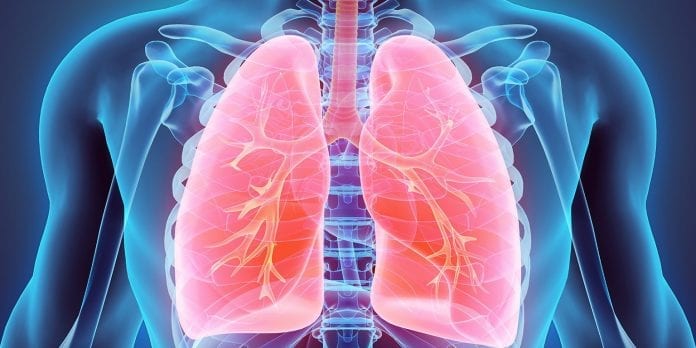Your lungs are essential to your ongoing health. Despite this, many people spend very little time thinking about their lungs.
The lungs occupy the front of your chest on both sides. They are full of tiny tubes known as bronchi which divide into even smaller tubes known as bronchioles.
You breathe air in through your nose and mouth. This passes down your windpipe and into the tubes in your lungs. At the end of each tube is a tiny air sac, this is where the oxygen is extracted from the lungs and pushed into the bloodstream.
A thin layer of fluid covers the inside of the lungs to facilitate this process. Any damage to the lungs or blocking of these tubes will reduce the amount of oxygen that can get into your bloodstream. This will affect your ability to do various activities. Depending on the severity of the issue it may be an issue when you exercise or simply moving around.
Fortunately, there are ways in which you can improve your respiratory health.

1. Test Yourself
The first thing to do is to have a test. You can’t actually do this yourself at home but you can book an appointment at your doctor’s.
They will have the necessary equipment to perform lung function tests and pulmonary function tests. These will evaluate the strength of your breathing, the volume of air in your lungs, how much is getting into your bloodstream, and even the strength of your breathing muscles.
In short, the doctor will have a good idea regarding how efficiently your lungs are currently working.
This will give them a good idea of whether you have any issues and what they may be. Your doctor can then advise you regarding a treatment plan. The good news is that, if you are otherwise healthy, poor lung performance is generally connected with Asthma, that’s something that can be easily rectified.
If you’re at all concerned with how your lungs are performing book a test today. Even if you’re not concerned it’s a good idea to have a lung function test periodically.
The test will also provide a benchmark, allowing you to tell if your lung power and performance is improving or not.
2. Exercise

The second method of improving respiratory health is hardly surprising, but it is effective. Medical experts recommend five 30 minute sessions of moderate exercise every week. It’s not just good for your respiratory system, it’s good for your overall health.
F you’re new to exercise it’s important to start slow and build up, this reduces the chances of you being injured.
When you exercise you’re forcing your lungs to work harder as your body calls for more oxygen. The harder the exercise the greater the need for oxygen to maintain muscle movement. This demand pushes your lungs, effectively increasing their performance and power.
As with anything exercise-related, you’re not going to notice the effects overnight, it takes time and persistence.
3. Be Prepared For Illness
The current pandemic has probably made you acutely aware of the dangers of getting ill. While it can be difficult to prevent illness, you can wash your hands regularly, keep your home clean, and take any vaccinations offered. Specifically, you’ll want to consider the flu vaccination. Having this will strengthen your immune system, reducing the likelihood of you contract a disease.
As flu and other illnesses can damage the internal surface of your lungs, taking any steps you can to prevent the issue is a good idea.
4. Eat Right

Following on from exercise you need to start thinking about what you eat. Healthy foods create a healthy body, and a healthy body is less likely to have issues with their lungs.
You’ll want to focus on whole foods including pasta that is rich in carbohydrates. These ensure your body has the energy it needs. Fruits and vegetables are also beneficial as they improve your vitamin and mineral uptake, helping your body fight infections.
A good dose of protein will also help your muscles to stay strong, increasing your metabolism and need for oxygen. This will boost your lung capability by itself.
5. Ventilate Your Home

One thing that many people overlook is air quality. The efficiency of your lungs is directly related to the quality of the air you breathe. Of course, it’s difficult to know the quality of the air you’re breathing or to control it outside of your home.
But, what you should be aware of is that allergens and mold in your home can get into your lungs and prevent them from functioning as efficiently as possible.
Mold is perhaps one of the biggest issues and is often a result of damp spaces under your home. The key to dealing with these areas is to install a high-quality sub floor ventilation system from extractair.com.au. This will allow air to flow under your home.
When air flows damp air is pushed out of the home, removing the opportunity for mold to grow. It will make a drastic difference in the air quality in your home.
In addition, you should consider air conditioning units. These will remove mold spores and other allergens, circulating better quality air inside your home. You may even notice the difference.
Of course, you’ll struggle to control the air quality in the workplace or when shopping. But, knowing that your home offers high-quality air will help to build lung strength.
The bottom line is that your lungs don’t need to perform poorly as you age. A few simple steps can transform their ability to absorb oxygen and pass it into your bloodstream. This will make a huge difference in your quality of life.
However, taking steps at home to improve your lung efficiency and capability should not substitute a visit to the doctor for a checkup. This is especially true if you’re potentially developing an issue, the quicker you visit the doctor the more they’ll be able to do to help you.









